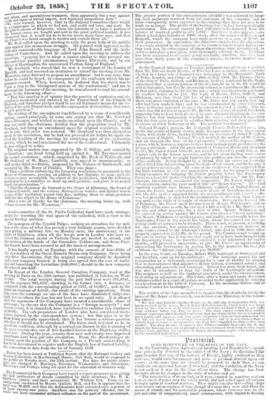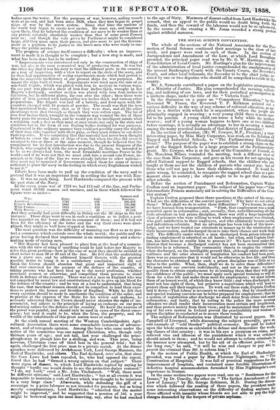Vruninrial.
LORD HARDWICKE ON THEi§TATE OF THE NAVY.
At the Cambridgeshire Agricultural meeting Lord Hardwicke's speech was principally devoted to the subject ()Petite Na ; he disclaimed the apprehension that any of the nations of EuroP63igh, y civilized as they now are, would turn buccaneers and make a piratieed descent upon our coasts ; at the same time we should be prepared to shoVithat we can vindicate our national honour if attacked; and the condition of the Navy is not such as it was in the time of our sires. The change has been brought about by changes in the state of science and art. " The introduction of steam had, as it were, created in maritime ;flatten a clean sheet of paper over the whole world, and had called upon all nations to begin again in nautical matters, They might consider that sailing ships were struck out as engines of war, though of course they were still fitter for means of transit and for mercantile purposes, where economy was an ob- ject and time of comparatively small consequence, with regard to floating
bodies upon the water. For the purposes of war, however, sailing vessels were at an end, and had been since 1850, when they first began to propel ships of war by the screw system. Since that time the nations of the world had began to create new navies. He must say, and impress it upon them, that he believed the condition of our navy to be weaker than at any period, certainly absolutely weaker than that of some great Powers near us ; and though the vote given by Parliament might be considered large, still they must open their purses, and give more to put the Govern- ment in a position to do justice to the brave men who were ready to em- brace the public service." The progress of science itself causes a difficulty ; when an improve- ment is made it is thought to be complete ; but a new step is made, and what has been done has to be undone.
" Improvements were introduced not only in the construction of ships of war, but also in the most economical way of producing them. It was but the other day- that it was his duty to visit the different ports in the country, on a tour of inspection, with a view to report on the state of the navy, and he then had opportunities of seeing experiments made which had proved to him the miserable inefficiency of our present ships for war purposes. He meant the ships built of wood. Experiments were tried upon the side of an oak-built frigate, which was plated with iron in sections in various ways. On one part was placed a sheet of iron four inches thick, wrought in her Majesty's dockyard ; another section was plated with iron four inches in thickness, but in different plates, the one over the other ; then there were plates of iron covered with indiarubber ten inches thick and various other preparations. The frigate was laid off a battery, and fired upon with 68- pounders charged with 16 pounds of powder. The result was that the iron first mentioned broke every shot as if they were dust, and all the other sheathings were shot through as though they were rotten eggs. The bit of iron four inches thick wrought in the common way resisted the fire of those heavy guns for several hours, and he would put it to intelligent minds what a revulsion such a fact as that must at once create not only in the state and condition but in the form of our floating bodies destined for war purposes. Constructed in the ordinary manner they could not possibly carry the weight of their iron sides together with their guns, so they must reduce or cut down their top sides. It was surprising that this material had never been thought of before to cover the sides of ships of war, but when the idea did occur it occurred to two or three at the same moment, though he believed that the compliment for its first introduction was due to the present Emperor of the French, who coupled it with the screw propeller. If, then, we intended to to be as we always had been, the most formidable maritime Power in the world—and if we were not that we must sink into a second rate Power, in- asmuch as in ships of the line we were already inferior to other nations— they must not be surprised if Government asked them for sums of money sufficient to place the navy on the footing in which every Englishman wished to see it."
Efforts have been made to puff up the condition of the navy and to pretend that it was an important item in settling the last war with Rus- sia. It was no such thing. Lord Hardwicke compared the present with the past state of the Navy-. In the seven years war of 1763 we had 113 sail of the line, and Parlia- ment voted 56,626 seamen and marines, and in those which followed the figures were as under—
Seamen and War. Date. Sail. Marines.
American 1782 • • .... 126 105,433 French Revolutionary. 1802 120 120,400 With France 1815 113 140.387 With Russia 1856 33 67,729
And they actually had great difficulty in fitting out the 33 ships in the last instance. Those ships went to sea in such a condition as to inflict a posi- tive injustice on the brave officers in command of them ; and if it had not been for the efficiency of the latter and the way their crews were disci- plined, they might as well have stopped at home. The next question was the difficulty of manning our fleet so as to pro- tect a commerce which extends over the whole world ; the public and the press having declared that impressment is an unsatisfactory and a slave- making mode of raising men. " Her. Majesty had been pleased to place him at the head of a commis- sion with the view of seing if anything could be laid before her Majesty to solve this great problem—how in the case of need they should be enabled at short notice to man 30 or 40 sail of the line. He felt that the undertaking was a grave one, and he addressed himself thereto with the greatest possible desire to bring it to a satisfactory conclusion. He did not think the Crown should abandon that great and important right it had ever exercised for the purpose of the defence of the country, of taking persons who had been bred up to the naval profession, whether merchant seamen or otherwise, and compelling these persons to stand forth in defence of the country. 'There was not a man in England who was not compelled by moral law and constitutional right to give up his blood for the defence of the country ; and he was at a loss to understand, that being the case, that merchant seamen should not be compelled to lend their exer- tions to protect the homes and firesides of England. While he felt that every exertion should be made to ameliorate the condition of the sailor, and to provide at the expense of the State for his widow and orphans, he - seriously advocated that the Crown should never abandon the right of im- pressment, but adhere to the principle of laying an embargo on our ports and seizing sailors for the defence of the country. He knew the exercise of the power was painful, and should only be used in cases of the direst emer- gency; but used it ought to be, when the lives, the property, and the wealth of the inhabitants of this great nation were at stake.'
At the ninth annual meeting of the Western Cambridgeshire Agri- cultural Association there were sonic remarkable instances of advance- ment, and of retrograde opinion. Among the boys who came under the notice of the committee was one named Christmas, who, though only thirteen years of age ; and not tall, last year challenged the prize- plough-man to plough him for a shilling, and won. This year, being nervous, Christmas came off third best in the general trial ; but he again challenged the first prize man to a private match. At the dinner speeches were delivered by Archdeacon York, Lord George Manners, the Earl of Hardwicke' and others. The Earl declared, inter olio, that since the Corn Laws had been repealed, he, who had opposed the repeal, found that he had "formed a wrong opinion on that subject." There were signa of dissent, to which Lord Hardwicke replied by saying he thought ` hardly one would desire to see the protective duties restored." a' I do, my Lord," cried a Mr. John Titchmarch. " Well, there must be different opinions," said Lord Hardwicke ; " but at all events it was impossible to maintain a code of laws which was thought to be injurious to a very large class." Afterwards, while defending the gift of a sovereign to a prize labourer as not intended for payment, but as being merely complimentary, Lord Hardwicke "admitted that the matter might be improved," and he suggested that a pension of 101. a year Might be bestowed upon the most deserving, say, after he had reached to the age of Sixty. Murmurs of dissent called from Lord Hardvricke the remark, that an appeal to the public would no doubt bring forth the funds, and then the reward of the labourer would not be so ephemeral. In the course of the evening a Mr. Jonas recorded a strong protest against artificial manures.



























 Previous page
Previous page